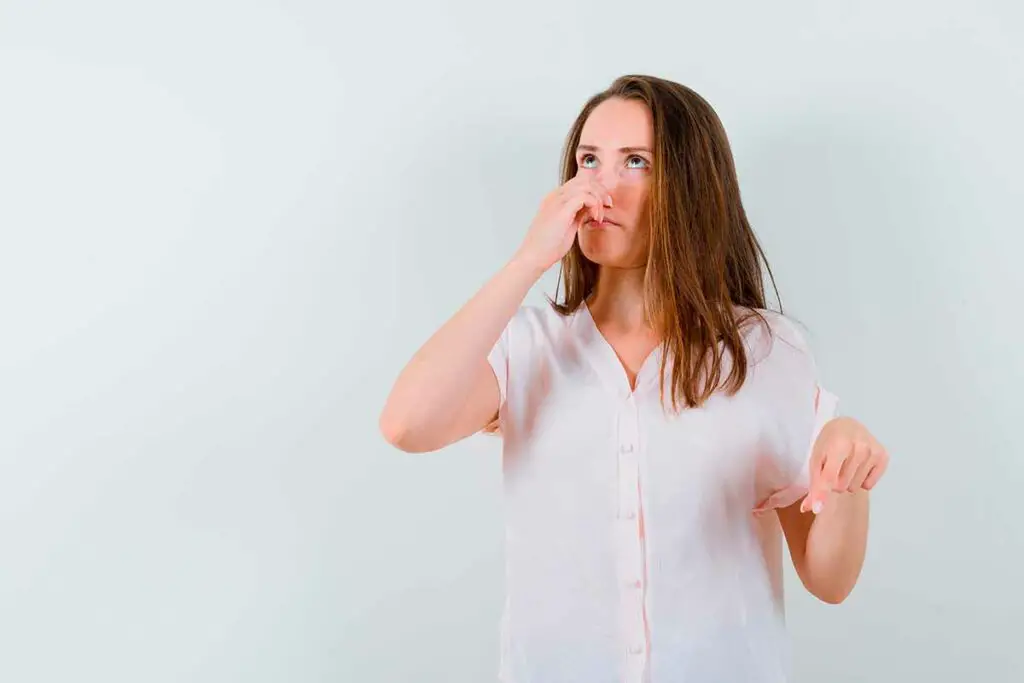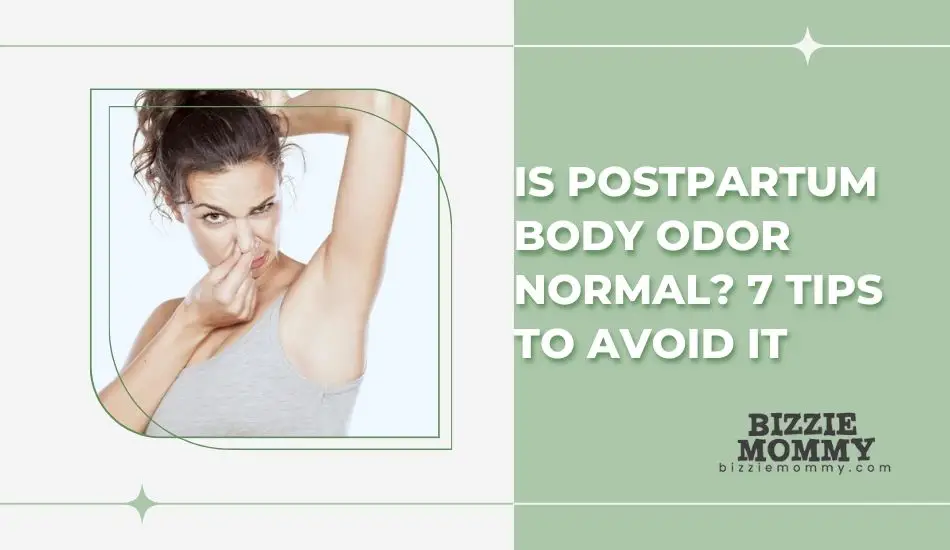Postpartum body odor is something many women deal with. It happens due to hormonal shifts, excessive sweat production, amniotic fluid, and vaginal discharge. This extra body odor makes many women uncomfortable, and they wonder if they can manage postpartum body odor. The answer is yes, you can. See the tips below to help you handle what could be an embarrassing problem.
Why Do I Sweat More Postpartum
Sweating more postpartum is very common, and there are actual reasons behind it. Once you have given birth, the estrogen and progesterone levels in your body, which were at really high levels during pregnancy to help your body maintain the pregnancy and induce labor, drop, and the prolactin hormone rises to help with the production of milk. All these hormonal changes affect your sweat production and body odor.
Though it is not the case for all women, for most women as your milk production increases, so will your sweat. This increased sweating mostly happens at night when you are asleep and is commonly known as ‘night sweats.’ Night sweats can be so bad that you might wake up from your body odor but know that this is normal and a natural part of motherhood.
Why is My Body Odor Worse After Pregnancy?
There are several reasons body odor may be worse after pregnancy. As soon as you deliver your baby, the estrogen levels in your body go through a dramatic decline, and progesterone levels take an even sharper dip. Due to these hormones dropping, the body goes through many biochemical changes. One of the biggest changes, as mentioned before, is night sweats or excessive sweating, which can ultimately lead to a worse body odor. However, excess sweat is not the only reason your body odor may worsen after giving birth.
Changes in weight and diet can also cause changes in body odor. For example, if you do not have time to prepare well-rounded meals, and you are just making and eating dishes that are not very healthy, your altered diet could be creating body odor issues.
Another reason for changes in body odor is related to the increased bodily fluids needed to carry out a healthy pregnancy. Once you give birth, your body rids itself of these accumulated fluids, which can cause body odor.
Finally, your body naturally releases strong odors from your chest and armpits to help your baby locate your breasts for feeding. This is a natural way for your baby to find food right after birth, but it also increases body odor.
How Long Does Postpartum Stink Last?
The postpartum period brings about significant changes in hormones, weight, and diet, which often affects both your mood and body odor. However, these changes typically begin to taper off around six to eight weeks post-birth.
The exact timetable for these changes to subside varies from woman to woman and is influenced by factors such as breastfeeding and the return of your period. Once your menstrual cycle returns, it is a sign that estrogen and progesterone levels are increasing, and your body odor should soon return to normal.
How Do You Get Rid of Body Odor After Pregnancy?
Maintaining good personal hygiene is crucial for new moms, especially when it comes to managing postpartum body odor. Following are some things you can do to get rid of body odor after pregnancy:
Shower Frequently
Showering frequently is essential for keeping body odor at bay. It will also help improve your mood and re-energize you while it eliminates the sweat and bacteria that cause odor. New moms often experience night sweats, so showering in the morning can help you feel fresh and clean. Additionally, taking an extra shower before bedtime can help keep body odor under control.
Remove Extraneous Body Hair
Body hair can cause an increase in odor-causing bacteria, making postpartum body odor worse. By removing extra body hair, especially armpit hair, you can prevent extra surfaces for sweat to attach to, which will help reduce postpartum body odor.
Use Deodorant
After showering and removing extra body hair, using a clinical-strength deodorant can help stop body odor. Be sure to avoid any sharp scents that might mix with your body odor and make it smell worse.
Hydrate
An easy and effective way to manage postpartum body odor is to stay well-hydrated. During the postpartum period, the body tends to produce more sweat, leading to dehydration. Drinking water can help release toxins while diluting the odors produced by the body. Try to drink the recommended 11.5 cups of water every day.
No Alcohol
Drinking alcohol postpartum can worsen your body odor. Alcohol increases your body temperature, which can cause more sweating, and with more sweating comes more odor. Also, alcohol mixing with the bacteria in the body releases a unique and unpleasant odor, which is only going to make the smell worse.
Apple Cider Vinegar
ACV is a great antibacterial and antiseptic agent that can help reduce body odor because it kills the bacteria responsible for causing odor. There are two ways you can use ACV for your postpartum body odor:
- The easiest way is to use an ACV soap. Be sure to do a patch test (using it in just one small area to make sure you don’t have a bad reaction) before going all in.
- The other method is to apply ACV with a cotton pad whenever needed. Just like the soap method, be sure to do a patch test first. If the ACV is too strong or you have a bad reaction, you can try diluting it with water.
Fresh Lemon or Lime Juice
Take a fresh lemon or soak a cotton pad in lemon juice and rub it under your armpits for about two minutes then hop in the shower. The citrus scent will help mask any unpleasant odors, while the antioxidant and antibacterial properties of the juice can help combat bacteria that cause body odor. As an added benefit, the high pH of lemon and lime juice creates an inhospitable environment for bacteria to survive. Overall, using fresh lemon or lime juice can be a useful and natural way to combat postpartum body odor. Just like with ACV, make sure to do a patch test first.
Although this is an issue many women deal with, postpartum body odor may be a sign of an underlying medical condition. If these solutions don’t work for you and your BO simply won’t go away, be sure to check in with your doctor or a medical professional.
Do Pregnancy Hormones Cause BO?

Sweat is the primary culprit of pregnancy body odor: you sweat more during pregnancy. There are several reasons why. First, blood supply increases during pregnancy to support the growth and development of your baby. This increased blood supply makes you feel warmer and sweat more.
Second, pregnancy weight gain and skin folds lead to more sweat, especially in 2nd and 3rd trimesters.
Estrogen also plays a role in sweating during pregnancy. Estrogen helps regulate your body temperature by increasing sweating. So, when estrogen increases, so does sweat. This effect may be familiar to women who experience increased sweating during their periods.
Some might also have night sweats during pregnancy, which can contribute to body odor. Night sweats can be caused by hormonal changes or shifts in metabolism and may be more common during certain stages of pregnancy.
It’s important to understand that body odor during pregnancy is normal and can start before you even realize you’re pregnant.
Does Breastfeeding Make You Smell Like BO?
It’s normal for breastfeeding mothers to experience changes in body odor, and it’s nothing to worry about. When you breastfeed, your body goes through hormonal changes, which can lead to postpartum body odor. During this time, you may produce different pheromones that your baby can sense, which can help with bonding and feeding. Body odor while nursing can also be caused by the decomposition of fatty substances from the apocrine glands in the underarm, breasts, and groin. You can manage this increase in BO by using deodorant and washing regularly.
7 Tips to Avoid Postpartum Body Odor
Some of the ways that you can avoid postpartum body odor are:
- Proper hygiene is essential in managing body odor. Taking frequent showers using cool water and medicated soap can help eliminate bacteria that cause body odor. It is also important to include washing your hair as it can contribute to overall body odor. Shampooing regularly will prevent the buildup of sweat and oils on the scalp. By maintaining good personal hygiene, you can reduce the risk of developing body odor and keep a fresh and clean scent throughout the day.
- When it comes to managing body odor, most people use deodorants and antiperspirants. However, for breastfeeding mothers, it is important to be aware of which products are safe to use around babies. This is because some deodorants and antiperspirants can have harmful chemicals that can get absorbed in the mother’s skin and not only harm the mother but can even pass on to the baby through breast milk. Check with your healthcare professional to determine the right deodorant or antiperspirant for you.
- Effective body odor management involves taking measures to reduce areas on your body where bacteria can flourish, such as areas with excessive hair growth. To manage BO, remove excess hair, especially in your armpits. Hair removal can be done by shaving, waxing, or using creams. It is important to remember that hair removal might cause irritation, especially in sensitive areas. So, to avoid this, you may need to choose a procedure that is suitable for your skin type and adhere to the correct aftercare instructions to reduce any irritation or issues.
- When dealing with body odor, using talcum powder on the affected areas is a helpful measure, except for the genital area. Loose clothing made of natural fibers can also aid in allowing your skin to breathe, making it less susceptible to dampness, which can contribute to body odor.
- To manage body odor, it’s important to manage your diet. Avoid consuming strong-smelling foods like garlic and chilis. Instead, opt for sweet fruits and vegetables, and remember to keep yourself hydrated.
- Another major factor of body odor is often stress, as it can lead to excessive sweating, especially when you are already dealing with pregnancy hormone shifts. Try to stay as stress-free as possible. Meditation, yoga, or light exercises are good methods of stress reduction.
- Changing clothes frequently can also help you manage your body odor. Clothes can trap sweat bacteria, which can not only make the sweating worse but can even cause allergies in sensitive areas like armpits. You don’t have to change multiple times a day but try not to wear the same clothes multiple days without washing them.
Bottom-line:
The postpartum symptom of body odor is completely normal. Your body goes through a lot postpartum! It has to produce breast milk, get rid of excess fluids, manage hormone levels, and try to recover from giving birth. The increased body odor is just a normal part of postpartum recovery and your body’s way of managing all the changes. You should not stress about it. Just focus on your new baby and take care of your health. The odor will fade within a few weeks.

